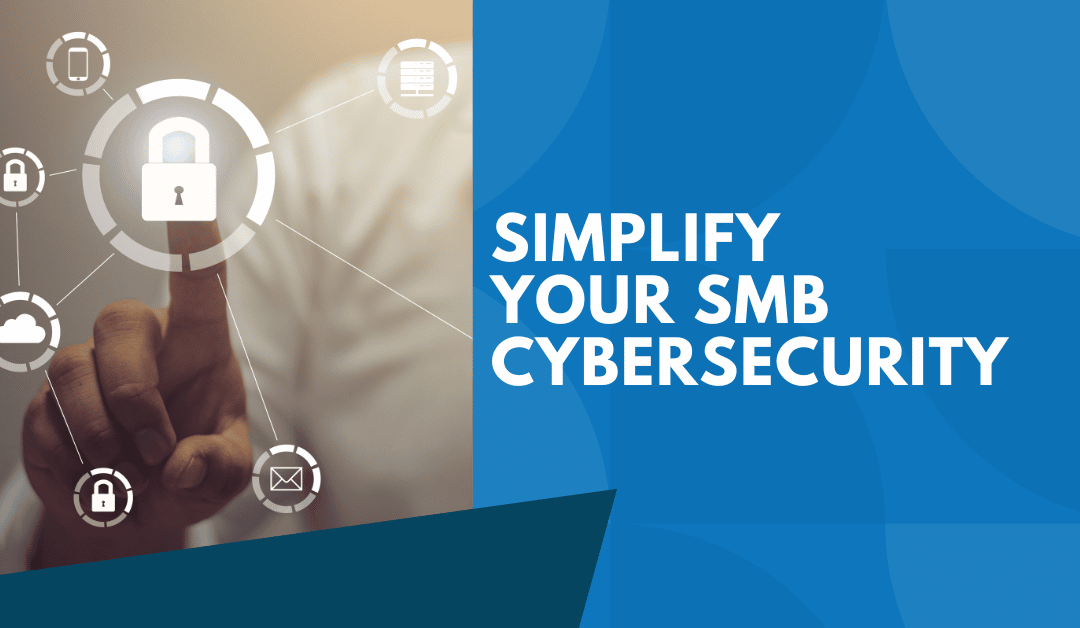Small and medium-sized businesses (SMBs) are constantly under threat from cyberattacks. In fact, SMB cybersecurity issues frequently arise as 60% of all attacks target SMBs. These Cyber attacks include data breaches, malware attacks, distributed denial-of-service (DDoS), phishing attacks, spyware and others.
The reason for this is simple: SMBs often lack the robust cybersecurity infrastructure of larger organizations, making them easier targets.
However, there are steps that you can take to simplify your cybersecurity and make your company a less attractive target. In this blog post, we’ll explore some of the most effective cybersecurity solutions for SMBs. By taking these steps, you can help protect your business from the ever-growing threat of cybercrime.
Why Small Businesses are prone to Cyber Attacks?
Small and medium businesses (SMBs) are increasingly becoming targeted by cyber criminals. With data breaches causing significant disruption, loss of business operations and potential financial losses, it is imperative for SMBs to take cybersecurity seriously.
In small companies, these problems result from a lack of resources as well as skills. Typically, smaller businesses do not have dedicated cybersecurity experts who protect them from hackers. You can take steps to close your IT knowledge gap, but cybersecurity is usually an area you need outside help with. In addition, SMBs often rely on outdated and vulnerable systems, making them easy targets for cyber criminals.
Cybersecurity helps ensure the safety of critical information such as customer data and confidential client files, protecting not only your sensitive data but also your reputation. Implementing robust cybersecurity measures including appropriate access control protocols and regularly monitoring activities on networks are essential steps to protect digital assets from malicious actors.
Some unsettling stats on SMB Cybersecurity Threats
- There’s a 31% increase in the average number of attacks per company since 2020
- On average, SMBs lose $212,000 annually due to cyber incidents that affected suppliers with whom they share data.
- 44% of data breaches include customer personally identifiable information (PII).
- It takes an average of 212 days to identify a data breach and an average of 75 days to contain a data breach.
- Phishing, having been observed in 41% of cyberattacks, emerged as the top infection victor in 2021. And other top threat victors included vulnerability exploitation, stolen credentials, Brute Force, remote desktop, removable media, and password spraying.
- The United States suffers from the most data breaches worldwide.
6 steps to take to Increase your Small Businesses Cybersecurity
When it comes to protecting your small business from potential cyber threats, taking proactive steps is key.
1.To ensure proper cybersecurity, begin by setting a strict password policy that requires complex passwords to be used and updated regularly. Also, a password manager is a valuable tool for small and medium-sized businesses (SMBs) looking to increase their cybersecurity. Password managers store user credentials in an encrypted format, making it difficult for attackers to gain access to them. This is especially important if you have multiple users accessing the same system or website.
2.Consider using two-factor authentication (2FA) to further secure critical systems from unauthorized access. This involves entering a one-time passcode or code via SMS text message in addition to your username and password, providing an extra layer of security.
3.Ensure your team is educated on the latest security protocols and best practices. Equip employees with tools to protect customers’ data, such as strong passwords and monitored internet use guidelines. Establish clear standards of behavior so everyone understands their role in protecting company information. Penalties should be clearly articulated so that all employees understand the expectations set forth by your cybersecurity policies.
4.Make sure your operating systems are up to date with the latest software and security patches. Many cyberattacks exploit known vulnerabilities in outdated software, so it’s important to stay on top of security updates and patches to minimize your risk.
5.Invest in antivirus software; pick one that offers both local and cloud-based protection. Cloud-based antivirus solutions are particularly useful for SMBs, as they can be accessed remotely and updated automatically. This helps ensure that your systems are always protected from the latest threats.
6.Regularly backup your data in case of a security incident. To ensure you can recover important information quickly and seamlessly in the event of an attack, consider using a cloud-based backup service or secondary server to create redundant copies of your data.
By taking these proactive steps to strengthen your SMB’s cybersecurity, you can help mitigate the risk of cyberattacks and protect your systems and valuable data from being compromised.
How to get started with implementing these changes
Implementing changes undoubtedly requires considerable planning and organization. Businesses need to assess their current levels of risk, identify vulnerabilities, and prioritize their implementation efforts.
- One of the easiest ways for small businesses to start implementing effective cybersecurity changes is to create an inventory of all hardware and software currently being used.
- Write down the guidelines needed as part of your cybersecurity update. For example, guidelines for choosing passwords, frequency of updates, and secure storage protocols.
- Next, prioritize what needs to be done by identifying the most pressing issues first and creating goals with realistic timelines.
- An action plan can then be created based on these goals to provide a roadmap for implementation.
- Finally, any staff who will be actively involved in the changes should be trained accordingly; they need situational awareness and knowledge of policies and procedures in order to best support their role during this process.
All these steps are necessary for successful change implementation.
The Benefits of Making Small Cybersecurity Updates
Taking small steps to update cybersecurity can have significant benefits for any business, especially smaller organizations with limited resources.
First and foremost, these steps can help protect vital customer and company data from malicious actors. Cybersecurity updates can also help prevent damage from ransomware attacks that are designed to steal, destroy or encrypt sensitive data. These changes will help increase trust in your business and build a reputation for protecting the privacy of your customers.
Additionally, updating cybersecurity practices can help save time and money by reducing downtime from security incidents. By minimizing these types of incidents, you will be able to focus on growing your business instead of dealing with security issues. This allows more resources to be allocated to ongoing improvement efforts and can be a stepping stone to better security overall.
Despite the Simplicity, Make Life Easier Using an MSP
Despite the ease of adding some of these cybersecurity aspects, a lot of small businesses are too swamped with the day to day of running their business in order to have the time or skills needed to actually implement these changes.
Small businesses can benefit greatly from outsourcing their cybersecurity to a managed service provider (MSP). An MSP is a third-party organization that specializes in managing and monitoring the IT infrastructure of an organization. By entrusting an external entity with its security needs, businesses can reduce the workload for their internal teams and ensure that their network is secure and up to date.
MSPs can also provide valuable expertise and guidance in developing effective cybersecurity practices. They will understand the latest threats and vulnerabilities, as well as best practices for mitigating them, and they can help businesses stay on top of emerging trends and changes in the security landscape.
Overall, partnering with an MSP is a smart choice for small businesses looking to implement effective cybersecurity changes and ensure the security of their networks.
SMBs are an important sector of the economy, and they face unique cybersecurity challenges. By taking the six steps outlined in this blog post, SMBs can improve their cybersecurity posture and protect themselves from cyberattacks. Implementing these changes may be daunting, which is why you can always look for help from a company like ANAX Tech, but either way the benefits are worth it. With an enhanced cybersecurity posture, SMBs can focus on running their businesses and not worrying about whether or not their data is safe.
Follow Us!



Trackbacks/Pingbacks